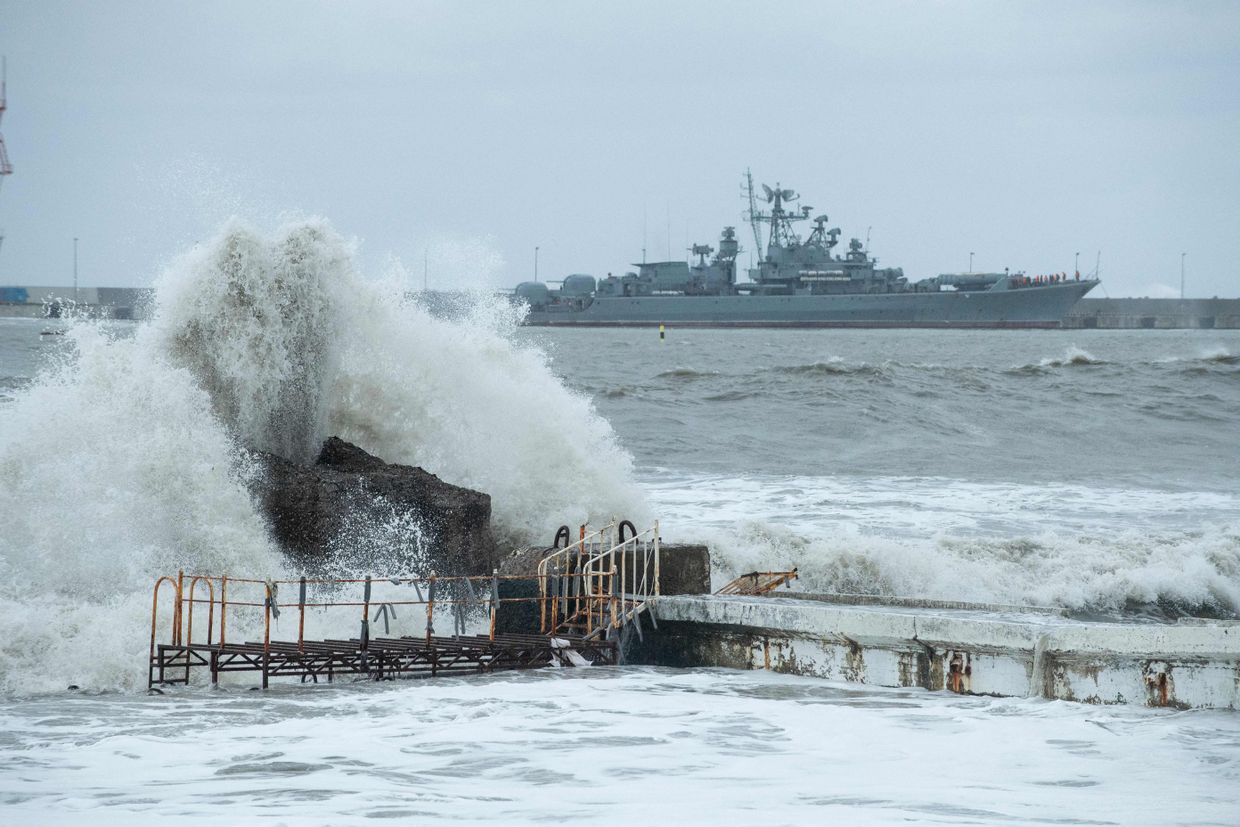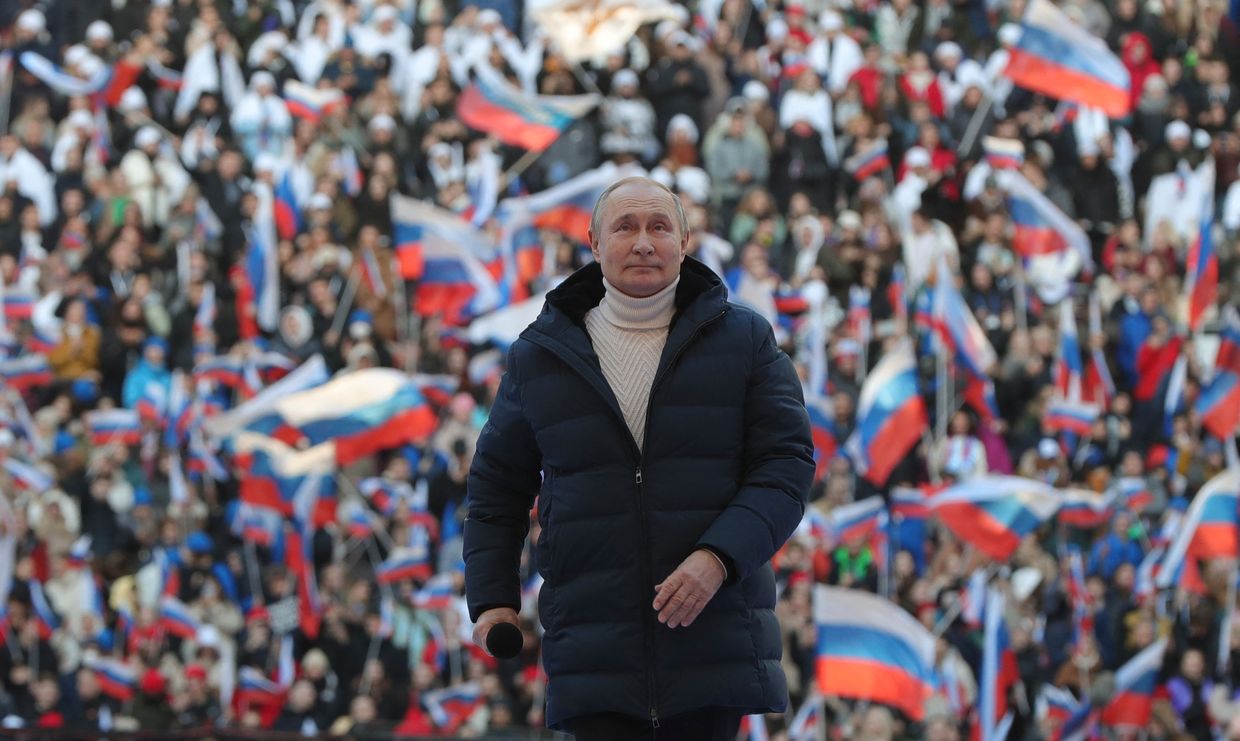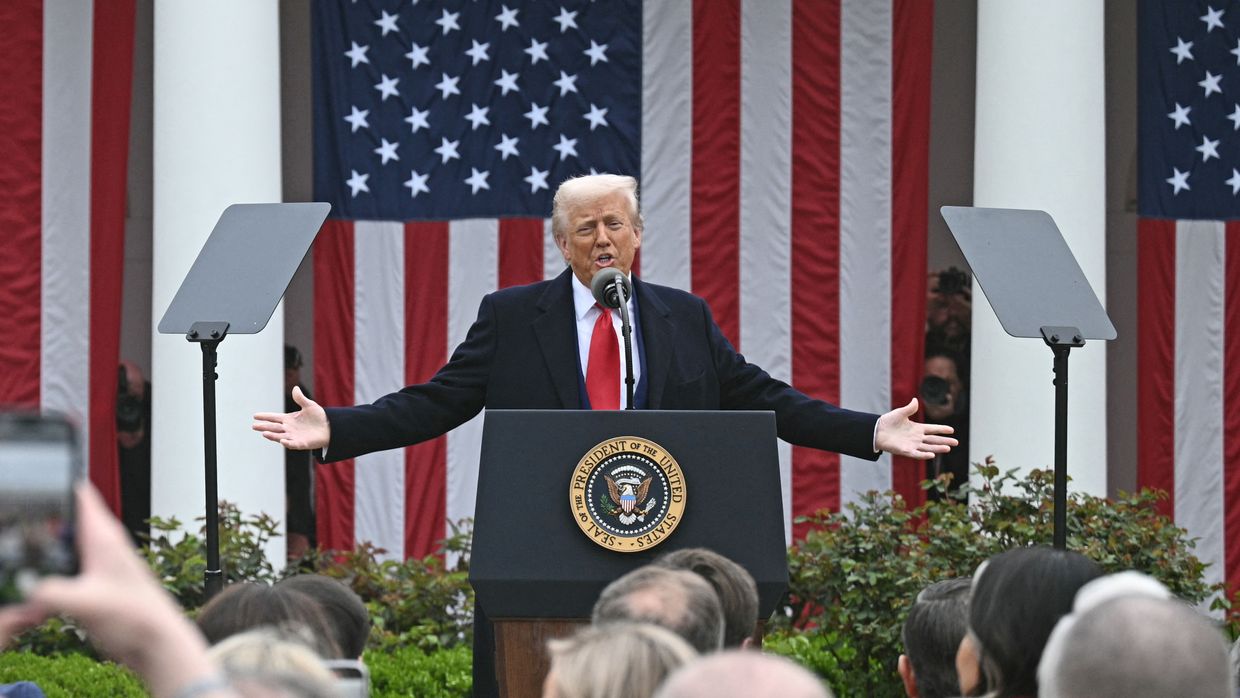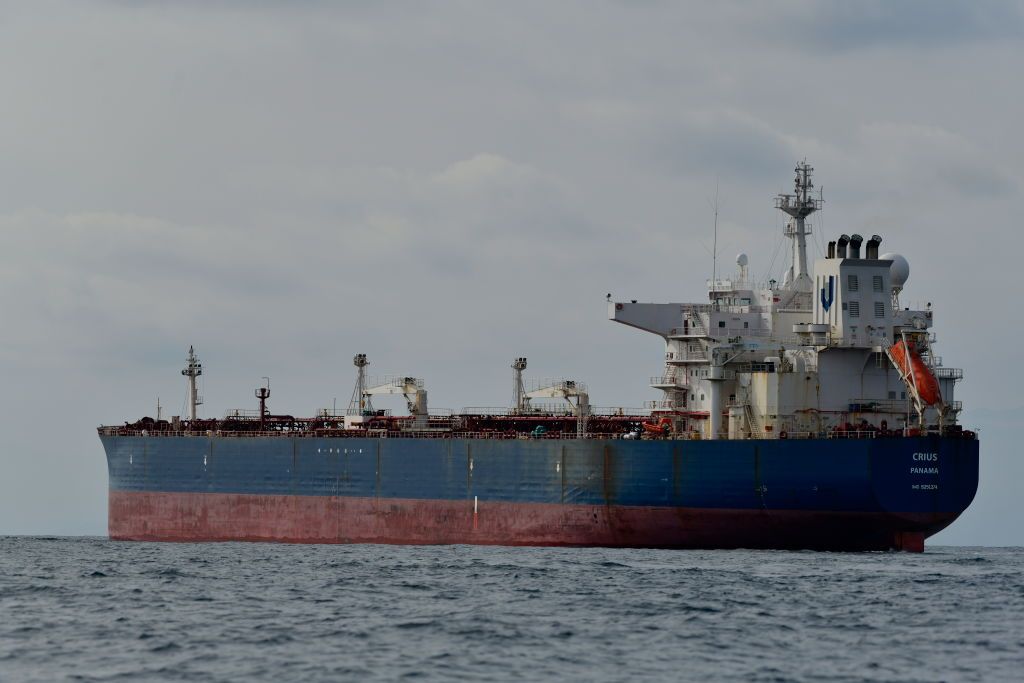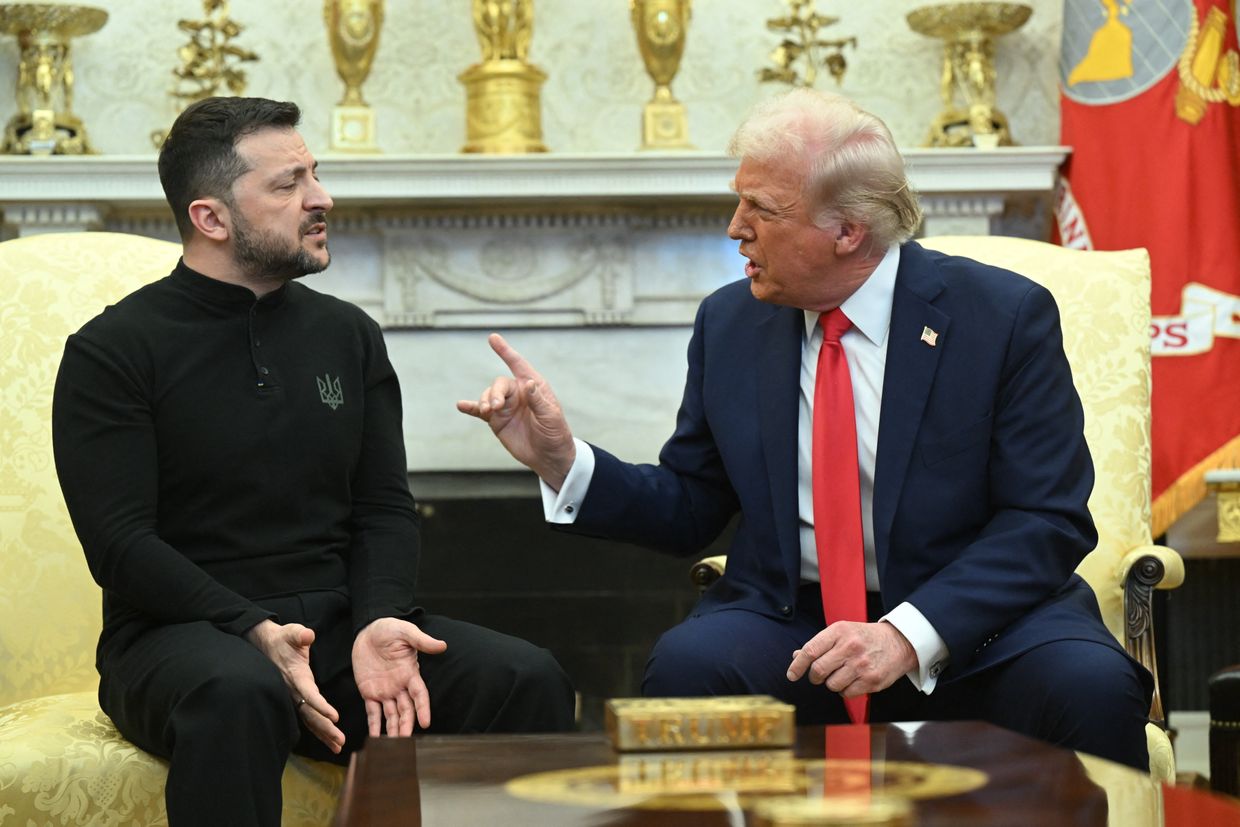As Russia refuses to accept ceasefire, will Trump pressure Moscow?

U.S. President Donald Trump departs after signing executive orders imposing tariffs on imported goods during a "Make America Wealthy Again" trade announcement event in the Rose Garden at the White House on April 2, 2025 in Washington, DC. (Andrew Harnik/Getty Images)
Three weeks ago, Ukraine and the U.S. agreed to implement a full 30-day ceasefire. Russia declined to do so, issuing a list of demands instead.
On April 4, Russia hit a residential neighborhood in the city of Kryvyi Rih with ballistic missiles and drones, killing 19 people, including nine children, according to local authorities. Seventy-five people were reportedly injured.
Each day afterward, at least one major Ukrainian city far from the front lines was struck by Russian missiles, resulting in civilian deaths.
Russia again and again showed it had no intention to stop the killings.

Implementing a ceasefire and putting a stop to the deaths and destruction is one of the key priorities for U.S. President Donald Trump. With no peace in sight, Trump has stated that he is "angry" with Russia and threatened to impose sanctions against Moscow.
Analysts say that the U.S. has enough leverage over Russia — it could pressure Moscow by increasing military aid to Ukraine, strengthening the enforcement of existing sanctions or imposing additional tariffs on countries that buy Russian oil.
So far, Trump has done none of that.
He has only imposed minor sanctions against Russian businesses, stopping short of any meaningful pressure.
Instead, Trump has mostly focused on pressuring Ukraine and making concessions to Russia in an apparent effort to encourage it to sign a ceasefire deal at any cost.
Jenny Mathers, a lecturer in international politics at the U.K.'s Aberystwyth University, said that "there have been some vague threats now and again about what Trump might do, but so far he has allowed (Russian President Vladimir) Putin to completely dictate the terms of the partial ceasefire and to put down a lot of markers about what Russia will not accept."
"The most powerful leverage of all would have been for the U.S. team to have refused to talk further with the Russians after they refused to accept a full ceasefire and made it clear that the U.S. would substantially increase military aid to Kyiv until Russia agreed to stop its military operations in Ukraine," she told the Kyiv Independent.
"But to exert leverage over Russia requires political will on the part of the Trump administration to do so, which has been notably absent."
Richard Betts, professor emeritus of war and peace studies at Columbia University, also said that "Trump has potential leverage on Russia but it is unclear whether or under what conditions he will use it — Trump is quite inconsistent, impulsive, and unpredictable."
"If Putin backs off a bit and offers some symbolic or minor concessions from his current demands, such a move might be enough to turn off Trump's threats of secondary tariffs or other penalties the U.S. might apply to Russia, since Trump so far has seemed generally predisposed in favor of Russia," he told the Kyiv Independent.
Trump's patience
The U.S. and Ukraine agreed to a full ceasefire on March 11, but Russia rejected it.
Instead, Ukraine, Russia, and the U.S. agreed on March 25 to halt attacks on energy infrastructure and fighting in the Black Sea.
However, the Kremlin has blocked the partial ceasefire as well, saying that the Black Sea ceasefire would take effect only after some sanctions against Russia are lifted. Russia and Ukraine have also accused each other of violating the ban on energy infrastructure strikes.
Russia continued to demand more.
Trump told NBC News on March 30 that he was "pissed off" and "very angry" regarding Putin's new demands that included creating a "transitional government" in Ukraine instead of the one currently in place.
"If Russia and I are unable to make a deal on stopping the bloodshed in Ukraine, and if I think it was Russia's fault — which it might not be — but if I think it was Russia's fault, I am going to put secondary tariffs on oil, on all oil coming out of Russia," Trump said.
"That would be that, if you buy oil from Russia, you can't do business in the United States. There will be a 25% tariff on all oil, a 25- to 50-point tariff on all oil."
On March 31, Trump again threatened to impose secondary tariffs on Russian oil exports if Putin does not "make a deal" to end the war in Ukraine.
On April 1, a bipartisan group of 50 U.S. senators introduced a bill that would impose sanctions on Russian energy purchases "if Russia refuses to engage in good faith negotiations for a lasting peace with Ukraine."
The legislation would impose a 500% tariff on imported goods from countries that buy Russian oil, gas, uranium, and other products.
Trump's threats to impose sanctions indicate his growing irritation with Russia's refusal to accept a ceasefire, but it has yet to be seen if such threats would translate into action.
"It does seem that the foot-dragging that we see from Moscow leads to patience running thin in the White House," Liana Fix, a Europe and Russia expert at the Council on Foreign Relations, told the Kyiv Independent.
"I wouldn't overinterpret this, however, as a fallout between the White House and the Kremlin, and we can easily see a turnaround from Trump with a more accommodating stance in the next conversation between these two leaders — or a Russian attempt to put the blame for the foot-dragging on Ukraine."

Mathers also said that "Trump is feeling irritated that the peace deal hasn't been signed yet, given that he is eager to get this war out of the way and focus on other things, and these remarks probably reflect that."
"But will Trump's irritation withstand a personal phone call with Putin?" she said. "Trump seems programmed to be sympathetic towards whatever Putin says, so I am expecting Putin to talk Trump around and probably wring a few more concessions out of Washington in the process."
Are 'secondary tariffs' realistic?
If Trump imposes tariffs on countries that buy Russian oil, it could be a devastating blow for the Kremlin. However, experts doubt that this plan is realistic.
"Additional sanctions against countries that buy Russian oil could indeed be an effective tool, as they could almost completely block its export," Oleksandr Parashchiy, an analyst at Ukrainian investment bank Concorde Capital, told the Kyiv Independent.
"However, the consequences for both the global and U.S. economies from such a blockade could be significant since Russian oil still accounts for a considerable share of the international oil market (around 7–8%). That's why, for now, it's hard to believe that Trump would dare to take such a step."
Yulia Pavytska, manager of the sanctions program at the Kyiv School of Economics' think-tank, KSE Institute, said that "secondary tariffs" could be a major blow to Russia but they are too complicated and risky and could cause an energy crisis.
If some countries are not deterred by tariffs and keep importing Russian oil, Moscow could even win by selling it at higher prices, Pavytska told the Kyiv Independent.
It doesn’t appear, however, that Trump is constrained by economic growth or by how the economy actually functions. Following Parashchiy's comments, Trump imposed tariffs on 180 states, alliances and territories, including the European Union, China and Ukraine.
Russia was not on the list.
Economists warned that the tariffs would have a negative impact on the global and U.S. economies.
Following the new sweeping tariffs, JPMorgan Chase reported on April 4 that it expected the U.S. economy to fall into a recession this year.
What else could Trump do to pressure Russia?
Apart from "secondary tariffs," Trump has a lot of leverage over Russia if he wants to use it, analysts say.
Mathers and Stefan Wolff, professor of international security at the University of Birmingham, argued that Trump could use both sanctions and an increase in military aid to Ukraine as leverage against Moscow.
Pavytska said that the U.S. could pressure Russia by strengthening existing oil sanctions.
The current $60-per-barrel price cap on Russian oil doesn't work because it is based on prices declared by Russian ports, which often lie, and because Russia is successfully using its shadow fleet, she said.
The Trump administration should sanction Russia's whole shadow fleet and apply the price cap on Russian oil to Chinese and Indian ports rather than Russian ones, Pavytska added.
Fox News journalist Jacqui Heinrich said on X on April 1, citing an anonymous source, that the Trump administration was considering "aggressive sanctions enforcement," including sanctions on Russia's shadow fleet.
So far, the U.S. has done the opposite.
Bloomberg reported on March 9, citing its sources, that the U.S. had rejected Canada's proposal to establish a task force to investigate Russia's shadow fleet of oil tankers.
Current sanctions are not enough
The Trump administration has already imposed some sanctions on Russia, but they are not significant enough to be used as leverage.
On March 13, the U.S. toughened sanctions on Russia's oil and gas industry by not renewing an exemption that allows Russian banks to access U.S. payment systems to conduct energy transactions.
The exemption, initially issued by ex-President Joe Biden's administration, was not re-signed by Trump and will make it more difficult for countries to buy Russian oil.
However, Pavytska said it is not clear if this exemption was canceled on purpose or by accident.
Moreover, the effectiveness of the measure was undermined as Hungarian Foreign Minister Peter Szijjarto said on March 21 that Hungary had received a waiver from the U.S. to buy Russian gas.

On April 2, the U.S. also sanctioned a network supplying the Houthis, an Iranian-backed rebel group in Yemen, with Russian weapons and stolen Ukrainian grain from the occupied territories. The network includes several Russian companies.
Pavytska argued that these sanctions could not be considered "strong" and would have an impact on the supply scheme for the Houthis but not on Russia.
"It looks as though the Houthis are the real focus of this measure — this group has become something of a fixation for the Trump administration and perhaps gives a sense that even Trump's desire to improve relations with Russia and get back to trading with Moscow takes second place to trying to damage the Houthis," Mathers said.
John Herbst, an expert at the Atlantic Council and a former U.S. ambassador to Ukraine, told the Kyiv Independent that the Trump administration's previous sanctions had not had much of an impact "because of all the other steps he's taken, which the Kremlin liked, like the pause on military aid and intelligence to Ukraine and the constant mimicking by senior Trump officials of Russian propaganda points."
"While Putin has clearly stalled Trump's efforts to achieve a ceasefire of any kind, he has not been punished for that in any serious way," Herbst added.
Making concessions to Russia
So far, Trump has been more inclined to use a carrot rather than a stick when dealing with Russia.
As part of the March 25 partial ceasefire deal, Washington vowed to help restore Russia's access to the world market for agricultural and fertilizer exports, lower maritime insurance costs, and enhance access to ports and payment systems for such transactions.
The Kremlin said that the ceasefire would take effect only after the West lifted some of the sanctions imposed on Russia. Trump said the same day that the U.S. was "looking at" lifting additional sanctions on Russia in order to secure the Black Sea ceasefire agreement.
Mathers said that the strategy of making concessions "is working really well for Putin, but I can't see that Trump is getting what he wants — a ceasefire deal, let alone a longer-term peace arrangement."
Herbst also argued that the U.S. had "offered unseemly and unwise sanctions relief in connection with the naval ceasefire."
"It encourages Putin to double down (on stalling the ceasefire) because he thinks he can manipulate U.S. policy," he said.

Herbst added that "Trump sanctioned Ukraine because he didn't like the way (Ukrainian President Volodymyr) Zelensky was speaking in the Oval Office."
He was referring to Trump's decision in early March to suspend military aid and intelligence sharing with Kyiv following a heated exchange with Zelensky at the White House. The aid and intelligence sharing were resumed on March 11.
"Putin has done far more damage to the peace process than Zelensky," he said. "Putin has clearly stalled. Zelensky has not. And yet, we have not seen much done to the Kremlin beyond that movement on the waiver (for payments in the energy sector)."

